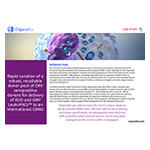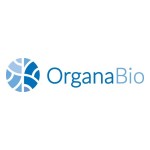MIAMI–(BUSINESS WIRE)–#biotech–The monoclonal antibodies (mAbs) daratumumab, and elotuzumab have been approved by the U.S. Food and Drug Administration for treating multiple myeloma (MM) in 2015. Although clinical responses have been promising, most patients’ disease eventually progresses [1]. One of the potential anti-tumor mechanisms of mAbs in MM patients is antibody-dependent cellular cytotoxicity (ADCC) which is mediated by natural killer (NK) cells. NK cells are activated when the Fe portion of an antibody (bound to target tumor cell) binds their Fe receptor (FcyRllla or CD16a) and triggers activation, degranulation, and tumor killing [2-3]. In efforts to enhance ADCC and tumor killing, researchers have identified a novel, relatively rare subset of human NK cells with increased ADCC activity following NK Fe receptor crosslinking [4-5]. This special NK cell subset is only detectable at levels of 3 -10% of total NK cells in only 25 – 30% of cytomegalovirus (CMV) seropositive individuals [6]. In order to utilize this specific NK cell subset as potential MM therapy, our client has developed an expansion method to allow scale up and manufacturing of these unique NK cells as an off-the-shelf, allogeneic cell therapy. To obtain these NK cells, our client needed a robust supply of fresh leukopaks from CMV seropositive donors.
OrganaBio was able to meet the client’s unique needs to rapidly provide PBMCs from 100 CMV+ donors for screening and donor qualification, to subsequently draw RUO and GMP LeukoPACs from selected donors, and to ship fresh leukopaks to the client’s COMO in Singapore.
PROJECT OVERVIEW
The client reached out to OrganaBio about a multi-phase project pertaining to extensive CMV seropositive donor screening for IND (investigational new drug) application-enabling work. For the initial phases of the project, the client required PBMC vials from leukapheresis of 100 unique CMV seropositive donors for testing. Later phases of the project included collections of whole fresh RUO and GMP leukopaks from donors identified to meet phenotypic and functional requirements of the client. To rapidly screen donors while minimizing cost to the client, the OrganaBio team suggested whole blood draws from donors as opposed to full leukapheresis collections. The minimal blood draw allowed donors to return sooner for a full collection (due to an 8-week deferral period between leukapheresis procedures) and was a cost-effective way for the client to screen and select donors. Donor recruitment, screening, and sample collections were performed by OrganaBio’s wholly-owned leukapheresis subsidiary, HemaCenter, LLC.
PROJECT MANAGEMENT
Utilizing our dedicated project manager, the project was managed cross-functionally by coordinating OrganaBio’s Sales, Process Development, and Operations teams and HemaCenter staff, and timely updates were provided to the client via bi-weekly meetings to maintain clear, comprehensive, and timely communications. In addition, a project management software was regularly updated by the different departments at OrganaBio, and the client was able to follow project progress at any time, view all donor attributes and sample characteristics, and note which donors were critical to their process.
Click here to read more about our case study.
About OrganaBio
OrganaBio is a robust and reliable biotech solutions provider for cell therapy and immunotherapy developers. OrganaBio has opened doors to a new Contract Technology Development Manufacturing Organization (CTDMO) paradigm that involves a passionate commitment to ethically accelerate the deployment of cell therapies by providing access to critical resources that are essential for therapeutic developments. The company’s products and services span the full development lifecycle – from proprietary tissue supply chains and cellular starting materials (e.g. MSCs, HSCs, NK cells, T cells, etc.) to expert development, testing, and other support services that expedite the path to clinical translation within our state-of-the-art, ready-to-use cGMP manufacturing facility, enabling the rapid and economical manufacture of clinical materials. For more information, visit https://www.organabio.com.
References
- Usmani SZ, Weiss BM, Plesner T, et al. Clinical efficacy of daratumumab monotherapy in patients with heavily pretreated relapsed or refractory multiple myeloma. Blood. 2016;128(1):37-44.
- Casneuf T, Xu XS, Adams HC III, et al. Effects of daratumumab on natural killer cells and impact on clinical outcomes in relapsed or refractory multiple myeloma. Blood Adv. 2017;1(23):2105-2114.
- Campbell KS, Cohen AD, Pazina T. Mechanisms of NK cell activation and clinical activity of the therapeutic SLAMF7 antibody, elotuzumab in multiple myeloma. Front Immunol. 2018;9:2551.
- Hwang I, Zhang T, Scott JM, et al. Identification of human NK cells that are deficient for signaling adaptor FcRγ and specialized for antibody-dependent immune functions. Int Immunol. 2012;24(12):793-802.
- Zhang T, Scott JM, Hwang I, Kim S. Cutting edge: antibody-dependent memory-like NK cells distinguished by FcRγ deficiency. J Immunol. 2013;190(4):1402-1406.
- Lee J, Zhang T, Hwang I, et al. Epigenetic modification and antibody-dependent expansion of memory-like NK cells in human cytomegalovirus-infected individuals. Immunity. 2015;42(3):431-442.
Contacts
Shilpa Ramesh, Marketing Director, [email protected]




